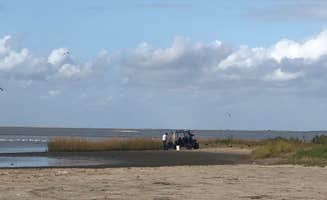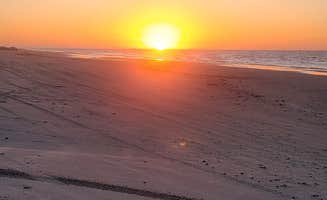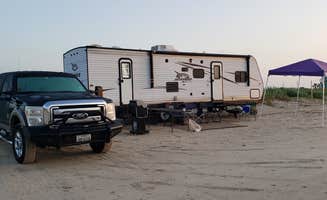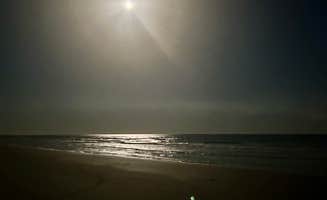Dispersed camping near Deer Park, Texas concentrates mainly on the coastal regions, with limited inland options. Most coastal campsites sit at sea level, featuring flat sandy terrain and subtropical climate patterns. Winter temperatures typically range from 45-65°F while summer temperatures regularly exceed 90°F with high humidity, creating distinctly different camping experiences based on season.
What to do
Fishing from shore: At High Island Beach, campers can fish directly from their sites. "This was a nice quiet place to camp, I arrived late and was the only one on the beach. It did get busy during the day with people fishing and swimming," reports Russell H.
Stargazing opportunities: The beach locations offer excellent night sky viewing due to minimal light pollution. At Surfside Beach Dispersed Camping, campers note exceptional stargazing. "Beautiful night stargazing and relaxing with the ocean waves. The days bright sun and cool water gave us great joy," shares Alana B.
Watch paramotors: The coastal areas attract powered paragliding enthusiasts. "There are also paramotors that fly overhead, they are fun to watch. Turn on to Rettilon road going towards the Gulf to get here," notes Gregtasha P. about the coastal beach areas.
What campers like
Quiet weekdays: Many campers report significant differences between weekday and weekend experiences. "There were approximately 8 boondocks here, there is adequate space to accommodate more. The weekends are loud and busy, during the week it calms down and gets quiet," mentions a visitor at Bolivar Flats.
Accessibility without 4WD: The compacted beach sand allows most vehicles access. At Gulf Side Oasis Beach Dispersed, campers report, "Absolutely breathtaking! Parked parallel to the dunes off the packed down sand! We're a good distance from all the houses to avoid any potential issues."
Extended stay potential: With proper supplies, longer stays are practical. "We spent 2 weeks here during the winter. It's a really quiet spot with a few other RV's here and there in the beach. We have AT&T and cell service was excellent," reports Will J. about his extended stay experience.
What you should know
Weather preparation: Coastal areas experience sudden weather changes requiring vigilance. "Check the weather! I was there the night of a tornado watch. 70 mile an hour winds and heavy rain. Got alerts on my phone," warns David P., emphasizing weather monitoring importance.
Seasonal insect concerns: Biting insects can be problematic during warmer months. "Only gave 4 stars because of the biting flies... They were swarming our dog, we had to keep her in the tent most of the time," notes Pam H. about her otherwise enjoyable beach camping experience.
Trash management: Pack-out practices aren't always followed by all visitors. "Unfortunately this beach is not maintained and individuals seem to not know how to pick up after themselves," reports Christian M. at Rollover Pass, highlighting the importance of proper waste disposal.
Tips for camping with families
Morning activities: Early hours provide better beach experiences for children. "The morning brought warm sun which allowed for a pleasant frolic in the ocean after waking," shares Nat&Rach C. about their family beach camping experience.
Weekday timing: Families seeking quieter environments should aim for weekday stays. "This was an amazing trip. We stayed Monday-Friday and were the only RVer there Thursday night," notes Jacqueline Z. about their family-friendly experience.
Sun protection: The intense Texas sun requires proper shade. "Recommend some type of canopy or awning, Texas Sun is HOT! Plan ahead, stores are few and far between," advises BL E. about preparing for daytime beach activities with children.
Tips from RVers
Parking strategy: RVers recommend specific positioning techniques. "Parked parallel to the dunes off the packed down sand! We're a good distance from all the houses to avoid any potential issues," advises Thomas and James S. at Follett's Island Beach, noting strategic parking locations.
Weight considerations: Heavier vehicles generally handle beach sand well. "We're about 17k pounds and had no issues driving and setting up on the sand," reports Wyatt J. about their successful beach camping setup.
Self-sufficient setup: No hookups means planning for full self-containment. "You have to be self sustained since there is nothing here...just you and the gulf," notes Stefan H. about the free camping options, emphasizing the importance of bringing all necessary supplies.







